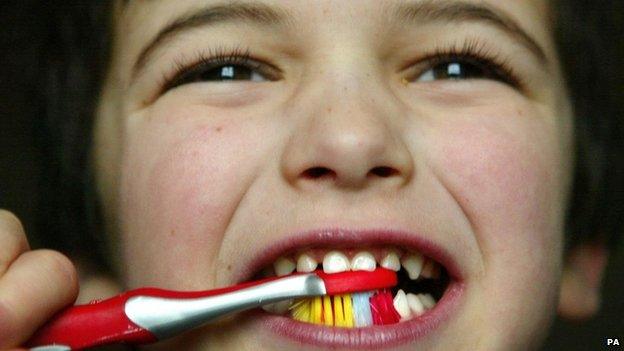Contracts 'keep dentists from poorer areas' in Wales
- Published

The report makes six recommendations, which also cover training and orthodontic services
Some NHS dentists are being discouraged from taking on patients in poorer parts of Wales because of how they are paid, an inquiry has found.
Paying dentists the same regardless of the amount of work involved "makes little sense," said Dai Lloyd, assembly health committee chairman.
He said current contracts "aren't working" and a fresh start is needed.
The Welsh Government has been looking at reforms while two Swansea practices are trialling a new way of working.
In numbers
1,479dentists doing NHS work
1.4mroutine check-ups and scaling
1.8mfillings and extractions
67%of children treated
52%of adults treated
34.2%of five-year-olds found with decay
Since 2006, NHS dentists in Wales have been paid a fixed fee for procedures they carry out - so whether they perform one filling or five fillings the payment is the same.
There is no incentive to take on more work and dentists are more reluctant to work in poorer areas as dental hygiene tends to be worse and it is harder to hit their targets.
Chief dental officer Colette Bridgman told the committee she accepted that dentists faced difficulties in very high-need communities.
"They find it difficult if they do the ethical, moral thing to see new patients, to accept all-comers and to provide the dentistry that's required," she said.
Dr Lloyd said the committee believed it was time to find a new way of "making sure everyone in Wales has access to quality dental services regardless of where they are".
The British Dental Association has already called for more investment for Welsh dentistry, to improve access and address the oral health inequalities "that continue to hold us back".
There has been criticism that the current payment system is "demoralising" and that dentists were not paid for preventative work, even though prevention was a "buzz word".
One pilot at a surgery in Swansea which has been allowed to switch from the contract system said its working environment had been "instantly transformed" and dentists felt free to tackle complex work - while also working on preventing dental problems occurring with their patients.
A Welsh Government spokesman said it was working closely with dentists to make improvements and would respond to the report in due course.

Analysis
By Owain Clarke, BBC Wales health correspondent
One of the key issues involves the contract which determines how much cash dental practices get for treating NHS patients.
To put it very simply, most dentists want to see the arrangements ditched.
And assembly members on the health committee agree, arguing the current payment rules could be hindering efforts to improve oral health overall by disincentivising dentists from taking on patients with more complicated problems, especially in poorer areas.
There have long been moves to look at ways of changing the contract - to focus less on payment for treatment and more on prevention.
And soon about 20% of dental practices in Wales will be involved in what the Welsh Government describes as "contract reform".
Yet despite these efforts, the health minister admits that bad oral health continues to be a big problem especially among vulnerable and disadvantaged groups.
These are the very groups that are finding it most difficult to get access to dental care in the first place.
- Published25 September 2018

- Published7 July 2017
